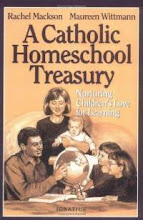Update: This live course has concluded and is available now as a recorded course through our Unlimited Access! Service. This is a great way to learn at your own pace when your schedule allows. To subscribe or learn more: Middle and High School Catholic Online Classes

(click on course title to register)
Class dates: Tuesdays, October 25 thru December 13, 2011
Total classes: 8
Starting time: 1:00 pm Eastern (12 pm Central)
Duration: 1 hour
Instructor: Monica Ashour, MTS; M Hum
Fee: $90 if you register on or before August 1, 2011. $120 after August 1, 2011 for all 8 classes.
Prerequisite: None.
Suggested grade level: 10th to 12th
High school credit: 1/2 semester credit in theology. For a full semester credit, you may precede with Theology of the Body or other theology course.
Course description: The students in this course will study the nature of the Church, that is, how She is in the “nature of a sacrament” (Lumen Gentium), along with all of her other aspects. Jesus Christ as the Bridegroom of His Bride, the Church, extends Himself through time via the Church who holds the “Deposit of Truth and the Deposit of Grace” through the Liturgy and the Sacraments and the Teaching Office. Such topics serve as a great segue into Mariology, a study of the Mother and Paradigm of the Church. Indeed, Pope John Paul II, whose motto “Totus Tuus” is directed toward Our Lady, continues to lead the Church into the “threshold of hope” for the new millennium; therefore, we will do a careful study of his thought in much of the corpus of his writing. Finally, we will examine the thoughts of our Holy Father, Pope Benedict XVI, who has written extensively on the Church and on the Liturgy.
Course goal: The final goal of this course is for each student to glorify the Father as a person “fully alive” (Ireneas) growing in intimacy with Jesus Christ, the Head of the Church and His Body, the Church through the power of the Holy Spirit—the Soul of the Church.
Course Outline: TBA
Homework: Weekly quizzes, major project, & final exam: To be graded by parents. (Answer key provided, with reference to Power Point.)
Course reading: The reading (excerpts) will assist the student in delving into a deep understanding of the nature of the Church and of the Sacraments. Many of these readings are available free online or used (click on the hyperlinks).
1. A Catholic Bible 2. The
Catechism of the Catholic Church; 3. The
Documents of Vatican II; 4.
Ecclesia de Eucharistia (Pope John Paul’s encyclical on the Eucharist and Its relationship to the Church.) 5.
Peter Kreeft’s Catholic Christianity, Ignatius Press 6.
The Weight of Glory and
Man or Rabbit, both by CS Lewis; 8. Joseph Cardinal Ratzinger (Pope Benedict)’s
The Spirit of the Liturgy, Ignatius; 9. Dr. Joyce Little’s
The Catholic Church and the Culture War: Secular Anarchy or Sacred Order (out of print from Ignatius but find on Amazon,etc.), C.R. Publications, Inc. 10. Fr. Godfrey Diekmann’s “Two Approaches to Understanding the Sacraments” (provided free by instructor).
Optional reading: For those who want more of a challenge/more credit earned: Hans Urs von Balthasar and Pope Benedict (Joseph Cardinal Ratzinger’s)
Mary: The Church at the Source, Ignatius. Even deeper challenge: Joseph Cardinal Ratzinger’s
Truth and Tolerance: Christian Beliefs and World Religions, Ignatius.
Future reading: Also recommended to form the imagination in ecclesial thought: Dante’s
Paradiso, Dostoevsky’s
The Brother’s Karamazov, and Shakespeare’s
The Tempest.
Instructor's biography: Having had 20 years of experience in the classroom, 3 years of experience working at St. Mary’s Catholic Church at Texas A&M University as one of the Campus Ministers, and Master Degrees in Humanities and Theological Studies from the University of Dallas, Monica Ashour comes to us with a breadth and depth of vision that will solidify and electrify high school students. Orthodox, passionate, and pedagogically adept, Miss Ashour reaches youth especially in the areas of Christian Anthropology, Moral Theology, and Social Ethics. Her former students come to her often with gratitude in preparing them for the various experiences that they faced in college. She is also a gifted speaker for the
Theology of the Body Institute.
Equipment requirements:
Classes are online, live and interactive. Students are required to have high-speed internet and
a headset with microphone.
Misc:
Miss Ashour will be available via email in between classes for questions and comments.
Recordings of classes are provided to students within 24 hours and available for 6 months.
Homeschool Connections does not provide record keeping services.
(click on course title to register)























